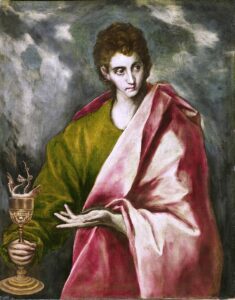The Gospel Authors
The identity of the gospel authors has been a topic of intense scrutiny for many years. It would seem to be an open question as there is no eye-witness account to verify who wrote these important documents. Liberal apologists argue they were likely not written by their namesake but instead were gradually authored over years or even decades by well-meaning early Christian scribes.
The early “church fathers” provide interesting testimony as to the actual authors of these documents. Some of them lived within a few short decades of the apostles themselves and some were personally acquainted with an apostle. They provided a completely unambiguous and unanimous opinion about who wrote the Gospels from their association with these witnesses.
The church fathers also fill in some of the important details regarding the origins of the four Gospels and support each other’s accounts regarding their historicity. Some of the church fathers knew the apostles personally (like Papias), or were only one generation removed (such as Irenaeus and Clement of Alexandria). The Fathers came from all parts of the ancient world and throughout the Roman Empire including Asia Minor (Turkey), Italy, France, North Africa, and Egypt. They likely personally did not know each other but they provide a coherent narrative regarding the Gospels’ origins.
We will go through each of the Gospels and try to determine who wrote the Gospels when they were written, and other important details regarding their origins.
The Gospel of Matthew
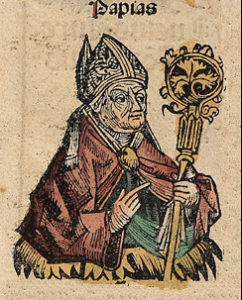
Papias – By Michel Wolgemut, Wilhelm Pleydenwurff (Text: Hartmann Schedel) – https://commons.wikimedia.org/wiki/File:Nuremberg_chronicles_f_112v_1.png, Public Domain, Link
Only Matthew and John were apostles of Christ; Mark and Luke were not personally acquainted with him. The early Church Fathers have a lot to say regarding the Gospel of Matthew.
Papias of Hierapolis wrote,
Matthew composed the sayings in the Hebrew dialect and each person interpreted them as best he could.
Papias was a Greek apostolic father and was bishop of Hierapolis (now modern Pamukkale in Turkey). He lived from 60 to 130 AD and wrote the Exposition of the Sayings of the Lord. He was personally acquainted with John who wrote the fourth Gospel and likely received considerable insight and knowledge of Christ from him.
Irenaeus from Lyon in modern-day France wrote,
Now Matthew published among the Hebrews a written gospel also in their own tongue while Peter and Paul were preaching in Rome and founding the Church.
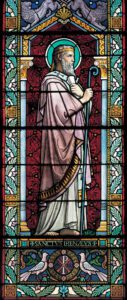
By Lucien Bégule – photo Gérald Gambier, Public Domain, Link
Irenaeus was a disciple of Polycarp, while Polycarp was (along with Papias) a disciple of the apostle John. Irenaeus asserted that all four of the Gospels were important and canonical scripture. He is the earliest witness that the Gospel of John was written by John the Apostle, and that the Gospel of Luke was written by Luke, the companion of Paul.
Clement of Alexandria for his part wrote,
Of all those who had been with the Lord only Matthew and John left us their recollections, and tradition says they took to writing perforce. Matthew had first preached to the Hebrews, and when he was on the point of going to others he transmitted in writing in his native language the Gospel according to himself, and thus applied by writing the lack of his own presence to those from whom he was sent.
Clement of Alexandria was a Christian theologian who lived during the second century and taught a the Catechetical School of Alexandria. He was a convert to Christianity and was an educated man familiar with Greek philosophy and literature. Little is known about his birth and death but during his lifetime was very influential in the early church.
All the church fathers who rendered an opinion on the origin of Matthew’s gospel agreed that Matthew – one of Jesus’ “apostles” who had “been with the Lord,” is the author of the gospel attributed to him.
The church fathers do not give an opinion on the exact date the gospel was written. However, they claim it was written during Matthew’s lifetime and after the resurrection of Christ. Irenaeus provides some additional detail that it was written: “while Peter and Paul were preaching in Rome.” (Irenaeus, Against Heresies, 3.1). Since Peter and Paul were both executed by Nero in about 66 – 67, this places the date of authorship between 33 and 67 AD. Irenaeus would likely have some knowledge of this date given he was a disciple of Polycarp who in turn was a disciple of the apostle John.
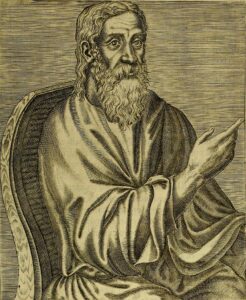
By André Thévet – Internet Archive scan of Les vrais pourtraits et vies des hommes illustres grecz, latins et payens, Public Domain, Link
The Church Fathers are also in agreement that Matthew was written in Hebrew – Matthew’s native language. The book was then “interpreted” or “translated” presumably into Greek which was a common language throughout the Roman Empire.
Interestingly, Jerome wrote that Matthew “first composed his Gospel of Christ in Hebrew letters” and that a copy was preserved “in the library of Caesarea.”
The early church fathers also agreed that Matthew wrote the gospel in Hebrew before Matthew departed from them to preach to others. The translator of Matthew’s gospel into Greek is not known but likely was not Matthew himself. While Matthew the tax collector was likely an educated man, he probably was not sufficiently fluent in Greek to enable such a translation.
The Gospel of Mark
Papias who was a disciple of the apostle John had much to say about the authorship of Mark’s gospel. He noted,
And the elder [John] used to say this: “Mark, having become Peter’s interpreter, wrote down accurately everything he remembered though not in order, of the things either said or done by Christ. For he neither heard the Lord nor followed him, but afterward, so I said, followed Peter, who adapted his teachings as needed but had no intention of giving an ordered account of the Lord’s sayings. Consequently, Mark did nothing wrong in writing down some things as he remembered them, for he made it his one concern not to omit anything that he heard or make any false statement in them.
Irenaeus of Lyons also wrote,
After their [Peter and Paul’s] departure, Mark also, the disciple and interpreter of Peter, himself handed down to us in writing the things which were preached by Peter.
Clement of Alexandria then added,
But a great light of godliness shone upon the minds of Peter’s listeners that they were not satisfied with a single hearing or with the oral teaching of the divine proclamation. So, with all kinds of exhortation, they begged Mark (whose gospel is extant), since he was Peter’s follower, to leave behind a written record of the teachings given to them verbally, and did not quit until they had persuaded the man, and thus they became the immediate cause of the scripture called “The Gospel according to Mark.” And they say that the apostle, aware of what had occurred because the Spirit had revealed it to him, was pleased with their zeal and sanctioned the writing for study in the churches.
The fathers agree that the author of the second gospel was indeed Mark who was a follower and interpreter of Peter. It is likely that Peter, as a fisherman in an obscure ancient village, was not literate and was incapable of writing a gospel. They also give hints that the gospel of Mark was written from memory. Since Mark did not have a word processor at that time to order all his recollections as they came to him, the order of his writing order is somewhat random; he would write his memories down as they came to him.
There is minimal disagreement as to when the gospel of Mark was written. Irenaeus suggests the gospel was written after the “departure” or death of Peter and Paul which occurred in or about the year 66 by Nero in Rome. On the other hand, Clement of Alexandria claims that it was written while Peter was still alive and that the apostle actually “sanctioned” Mark’s work so that it could be read in churches. However, they all agree that the gospel of Mark was written by Mark, summarizing the recollections and teachings of the apostle Peter, and the gospel was written during the lifetime of Mark.
The Gospel of Luke
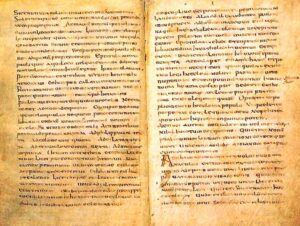
Muratorian Fragment – By Unknown author – http://www.neverthirsty.org/pp/bible-questions/answer01099-what-is-the-muratorian-fragment.html, Public Domain, Link
Evidence that Luke is the author of his gospel comes from a wide variety of ancient authors across the ancient world in what would be modern-day France, North Africa, Rome, and Egypt.
Luke also, who was a follower of Paul, put down a book the gospel which was preached by him. (Ireneus of Lyons).
The Muratorian fragment is the oldest copy of a list of most of the New Testament. It is in seventh-century Latin making it difficult to read and is likely a translation of a Greek original written about 170 AD. The definitive list of the 27 books of the New Testament did not occur until the year 367 when formalized by Athanasius of Alexandria in his annual Easter letter.
The fragment, now housed in Rome, reads in part,
The third book of the Gospel is that according to Luke. Luke, the well-known physician, after the ascension of Christ, when Paul had taken him with him as one zealous for the law, composed it in his own name, according to [the general] belief. Yet he himself had not seen the Lord in the flesh; and therefore, as he was able to ascertain events, so indeed he begins to tell the story from the birth of John.
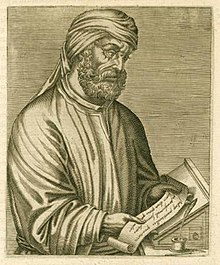
Tertullian of Carthage – Public Domain, Link
Tertullian of Carthage was another ancient church father from North Africa from the third century who wrote in Latin. He was very prolific writing against heresy including Christian agnosticism. He is called the father of Latin Christianity and the “founder of Western theology.” He is also the first writer in Latin to use the term “trinity” in his development of early Christian theology. Tertullian wrote,
Luke, however, was not an apostle, but only an apostolic man … not a master, but a disciple, not so inferior to a master – at least as far as subsequent to him as the apostle [Paul] whom he followed … was subsequent to the others. … Even Luke’s form of the Gospel men usually ascribes to Paul.
Origen of Alexandria was another church father who wrote regarding the authorship of the gospel of Luke. He was a Christian scholar and ascetic who lived most of his life in Alexandria, writing about 2,000 treatises in multiple branches of theology. Origen is described as “the greatest genius the early church ever produced. He ended up being tortured by his faith during the Decian persecution in 250 AD and died several years later from his injuries. He was the first to propose the ransom theory of atonement such that Christ’s sacrifice served as a ransom for believers. He also significantly contributed to the concept of the Trinity. He wrote concerning the gospel of Luke,
And thirdly, that according to Luke, who wrote, for those who from the Gentiles [came to believe] the Gospel that was praised by Paul.
In summary, all of the earliest scholars agree Luke wrote the gospel attributed to him. None of the Fathers tried to hide the fact that Luke was not an apostle or an eyewitness of Christ. As a matter of fact, Luke was a Gentile and so not even a Jew and yet wrote both Luke and Acts. He was also a second-generation Christian and not a convert to the faith.
Luke is described as writing down the gospel that was preached by the Apostle Paul. There is no hint that Luke was acting as a translator for Paul presumably since Paul was extremely educated, knew multiple languages but usually spoke in Greek, and did not need a translator or a transcriber.
Luke is described as a “well-known physician” suggesting he was not a stranger to the early Church. The Gospel of Luke was written by Luke for Gentile converts – the non-Jewish Christians who were being converted by Paul. This makes sense as Luke was a companion of Paul who was self-described as the “apostle to the Gentiles.” (Romans 11:13).
According to Origen, Luke’s gospel was written “third” – after the gospel of Matthew and Mark. Origen also writes the gospel was written while Paul was still life, which would place the authorship sometime before 67 AD. Origen notes that,
Luke wrote … the Gospel that was praised by Paul.
Origen is referring to 2 Corinthians in which Paul praises a companion of his who is famous throughout the churches,
With him [Titus] we are sending the brother who is famous in the Gospel among all the churches; and not only that, but he has been appointed by the churches to travel with us in this gracious work which we are carrying on, for the glory of the Lord and to show our goodwill.
Jerome – a fourth-century church father, interpreted Paul’s writings this way,
Luke, a physician from Antioch, indicated in his writings that he knew Greek and that he was a follower of the apostle Paul and the companion of his journeying; he wrote a gospel about which the same Paul says, “We have sent with him a brother whose praise is in the gospel throughout all the churches. (Lives of Illustrious Men, 7).
Paul is likely writing about Luke whose “praise is in the gospel” written by him.
The Gospel of John
The ancient Church Fathers provide more detail concerning the authorship of the Gospel of John than any of the other gospels.Irenaeus wrote,
Then [after the publication of the Gospels of Matthew, Mark, and Luke], John, the disciple of the Lord, who had even rested on his breast, himself also gave forth the Gospel, while he was living in Ephesus in Asia.
The Muratorian Canon of Rome noted,
The fourth of the Gospels is that of John, [one] of the disciples. To his fellow disciples and bishops who had been urging him [to write], he said, “Fast with me today for three-days, and what will be revealed to each one let us tell it to one another.” On the same night it was revealed to Andrew, [one] of the apostles, that John should write down all things in his own name while all of them should review it.
Clement of Alexandria posited,
Of all those who had been with the Lord, only Matthew and John left us their recollections, and tradition says that they took to writing perforce … John, it is said, used all the time a message which was not written down, and at last took to writing for the following cause. The three gospels which had been written down before were distributed to all including himself; it is said he welcomed them and testified to their truth but said that there was only lacking to the narrative the account of what was done by Christ at first and at the beginning of the preaching. … They say accordingly that John was asked to relate in his own gospel the period passed over in silence by the former evangelists.
And finally, Tertullian noted,
We lay it down as our first position, that the evangelical Testament has apostles for its authors. … Of the apostles, therefore, John and Matthew first instill faith into us; whilst of apostolic men, Luke and Mark renew it afterward.
The Church Fathers are unanimous that John who was an eyewitness to Christ wrote the gospel attributed to him. The most important early witness was Iraneous who was a disciple of Polycarp who was himself a disciple of John. It is also reported that the Gospel of John was written after the others and that one of the purposes of John writing the gospel was to fill in a few details.
Another reason why the Gospel of John was written was to defend the divinity of Christ against the teachings of a man named Cerinthus and a group known as the Ebionites. John placed special emphasis on the divinity of Christ. In this regard, Irenaeus notes,
John, the disciple of the Lord, preaches this faith and seeks by the proclamation of the Gospel, to remove the error which by Cerinthus had been disseminated among men. … According to the opinion of no one of the heretics was the Word of God made flesh. … Therefore the Lord’s disciple, pointing them all out as false witnesses, says, “And the Word was made flesh, and dwelt among us.”
It is interesting that some of the Church Fathers describe John as being “simple … in speech” and having “neither the knowledge nor the desire to represent the teachings of the Master in persuasive or artistic language.” (Eusebius Church History; 3:24.1-7). Scripture implies that both John and Peter were not literate or “uneducated.”
When they saw the courage of Peter and John and realized that they were unschooled, ordinary men, they were astonished and they took note that these men had been with Jesus. (Acts 4:12).
John and James were both the sons of Zebedee, and according to church tradition, their mother was Salome. They were fishermen by vocation and likely had little if any formal education, especially since the literacy rate of first-century Israel was only about three percent. Much more likely is that John dictated his text to a secretary as suggested by one ancient Christian text,
The Gospel, therefore, written after the Apocalypse, was also given to the churches in Asia by John while still living in the flesh, as the bishop of Hierapolis, Papias by name, a dear disciple of John, has related in his “exoteric,” that is, in [his] last five books, who wrote out this Gospel, John dictating it to him. (Anti-Marcionite Prologue to the Gospel of John, Recension 2).
The distinctive voice of the Gospel of John could easily be explained as being the writing of a secretary – perhaps Papias, as the gospel was transcribed. The ancient church fathers are unanimous in ascribing the source of the Gospel of John to be John himself and not some other person.
The Opinions of Ancient Skeptics as to The Gospel Authors
The widely held opinion that the source of the four gospel was te writer attributed to them was not only held by the Church fathers, but also by critics of the church. Ancient heretics and pagan skeptics all held that the four Gospels were actually written by Matthew, Mark, Luke, and John and not some other source.
Irenaeus points out that the various sects that arose in the ancient world tended to use only one of the four gospels for their proof texts. For example,
- The Marcionites used only a portion of the Gospel of Luke,
- The Ebionites used only the Gospel of Matthew,
- The Valentinians used only the Gospel of John
However, all of the heretical groups from the early centuries of the church ascribed the authorship of the Gospels to their namesake.
For example, Celcius, one of the fiercest critics of the early church, noted,
The disciples of Jesus, having no undoubted fact on which to rely, devised the fiction that he foreknew everything before it happened. … The disciples of Jesus wrote such accounts regarding him, by way of extenuating the charges that told against him. (Celsius, Against the Christians).
Summary For The Gospel Authors
The earliest Christian writings give no indication to support the now popular assertion that the Gospels were originally written by somebody else than their traditional author. No one, orthodox or heretic, again or Christian, raised any objection to the authorship of the four Gospels.
The theory of third party authorship of the gospels by unknown authors has no support from those living near the time of their authorship.
There are minimal discrepancies among the gospels which logically would be expected if they were written independently by multiple authors over decades of time. What is more remarkable is the degree to which they agree with each other. When these gospels were written, there was no communication ability among the writers to check and be sure their accounts agreed with each other. The few discrepancies serve only to support the historicity of the events noted in Scripture.
Reference
Pitre, Brant, The Case for Jesus, 2016.

